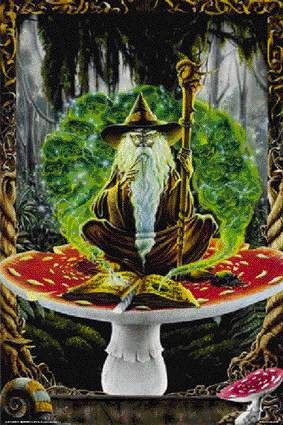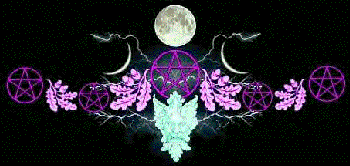THE CHARMED ONE'S | home
Goddess, Are You Real? | The Wiccan Rede | What is Wicca? | SO YOU WANT TO BE A WITCH? | For Beginners | How Do I Tell Mom and Dad I am A Witch | How do I become a witch? | Looking For A Teacher? | The Craft | Basics of Magick | Self-Blessing | CHARM MAKING | Paganism | Thirteen Goals of a Witch | The Witches Creed | CORRESPONDENCES | To be a Witch is | The Charge of the Goddess | BOOK OF SHADOWS | More Information | Contact Me | Witchy Links | Web Rings | The Good Witch Of The North | Mailing List
Paganism

Introduction to Paganism
The following is an Article that was sent to me via email. I am unaware of its origins, so if any one knows please email me. However, I am including this on my site, because I feel that it describes and explains the origins of Paganism. So enjoy.
Paganism worldwide is ever increasing in numbers across the boards in statistics. But what is Paganism? Sure it precedes Christianity but where did it come from? What is it about?
Well, Lets try to begin with the word Pagan. The word Pagan is the rough combination of the Latin words "Pagus" and "Paganus" and loosely translates as 'country dweller'.
Our Ancient Ancestors were very much country dwellers, they founded many of the philosophies and traditions Modern Pagans practise today. Simplistically speaking pagan practises derive from western-based societies. Pagan belief was born through a life reliant on the land thus a reverence for Earth and nature inspired a wisdom and enlightenment that has since transcended time and still flourishes today. Modern Pagans today, still seek spiritual enlightenment through the tried and tested beliefs of our forefathers and mothers!
As in Ancient times Pagans still remain as diverse as the cultures they descended from. The Romans, the Greeks, the Celts and even the Ancient Egyptians influence Pagan Traditions even today. Many different traditions, from Wicca to Druidry, Shamanism to re-emergence of Ethnic based Paganism all originate from "country dwellers" of the past and continues to evolve and grow.
Seeking Enlightenment
Pagans are individually diverse but still universally united by the common bond of seeking mental, physical and spiritual enlightenment through connecting with the earth and Deities such as Gods and Goddesses which, depending on an individuals interpretation, emulates the divine force of what we see and feel and even of that which we cannot. Pagans feel things are neither good or bad but more accurately have a place, life is cyclical in it's patterns and processes.
Beliefs of a Pagan are that of a chosen nature, they follow a personally selected path, a voyage towards balance and harmony. Pagans embrace self-expression and self-evolution. Life is Love and its cycles take us with it. These cycles can be seen strongly in three stages of life, Death, Rebirth. This cycle is constantly bringing forth the new, the ending of the old, and the recycling of all to be born again. This does carry over into the views of every Pagan on Death. Generally a Pagan does hold high re-incarnation but some traditions vary and Heaven and Hell aspects do exist to those within a different tradition.
All life is cyclical even when a physical death takes palace these are the thoughts of Pagan. In Paganism every Individual has the right to worship, interpret and practise in their own manner. Few actual Pagan leaders exist and even fewer absolute doctrines. Paganism purely is a self-evolving and self-guiding path. Our tools are the Earth, Deities and wisdom.
Rituals and Festivals
Pagans do have Rituals and Festivals that again, vary across the many different traditions. Rituals celebrate milestone like events in our lives, nature and in the realm's of the divine force. Some Pagans practise rituals and festivals solo, others in groups. Generally there are 8 major Pagan festivals being Samhain, Yule, Ombolc, Beltane, Litha, Mabon and Eostre. These are mainly marking the changes in the season, each season brings every-one something meaningful. Paganism is built around the individual, the journey though aims for the same destination, is as diverse as the vehicles many people use to get around.
Paganism reinforces tolerance; each individual will be different and has the right to follow their own path freely. Some Pagans are vegetarians some are not; some are witches, yet not every Pagan is a witch. Paganism nurtures the individual therefore Pagans revere freedom of belief, Morals and Ethical choices remain in the realm of the individuals path, no general Law is promoted nor enforced, but in saying this Pagans take responsibility very seriously and often live by the saying "Do as thou will, but Harm none". Self-responsibility is integral to a Pagan enlightenment for without truth we do not grow. We are therefore out of tune and lacking in the balance nature surrounds as with.
Religious Freedom
Pagans do not worship Satan, nor defile symbols or pervert texts of other religions or teachings. Pagans do not perform flesh sacrifices, nor promote drug use, nor orgies. Pagans do not sexually abuse children or seek to control another's will.
Over all Paganism is nothing to be feared. It is infinite in its religious freedoms and dependent on a personal involvement that brings many rewards. Now with Paganism blooming as it is there are many great books, organizations and resources for Pagans or interested persons. Enjoy but keep in mind Paganism is about your personal own journey, nothing here is right nor wrong. It all has its own place and value. Paganism is a celebration of life and freedom, and is not heavy in doctrine and leaders! Always follow your own voice and perhaps harness the Pagan inside us all!.




